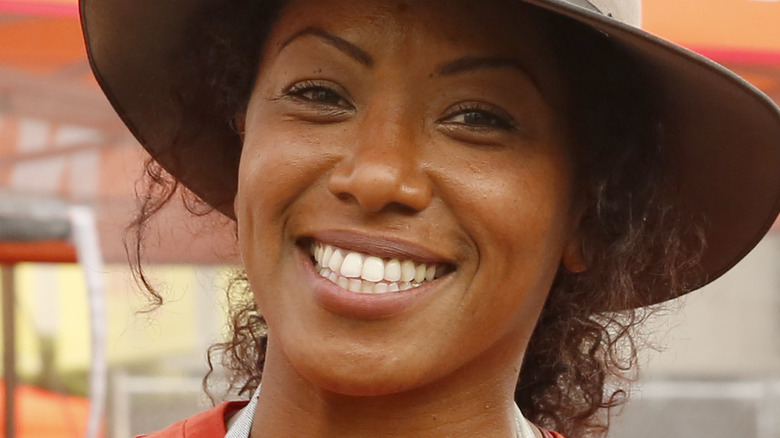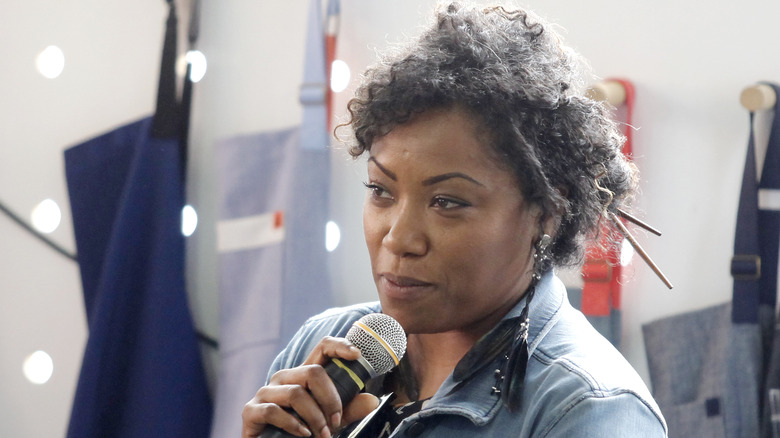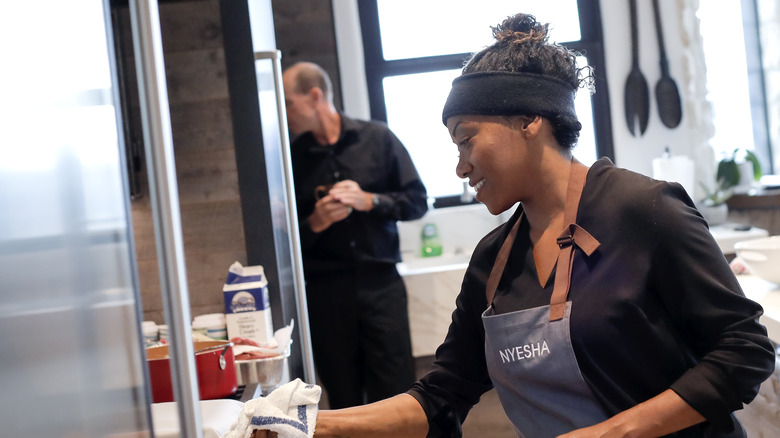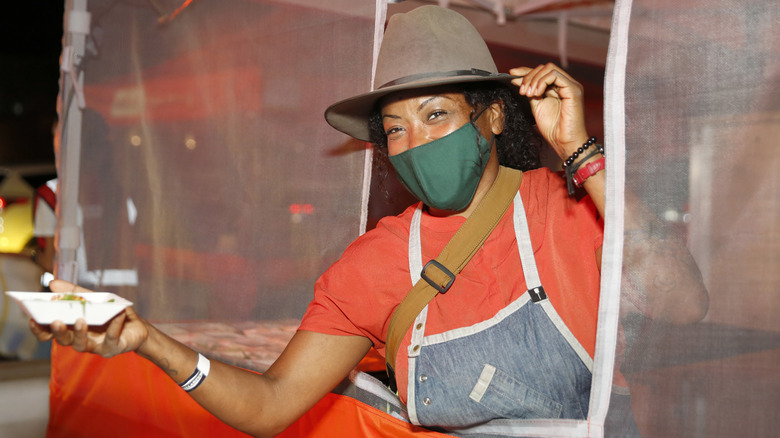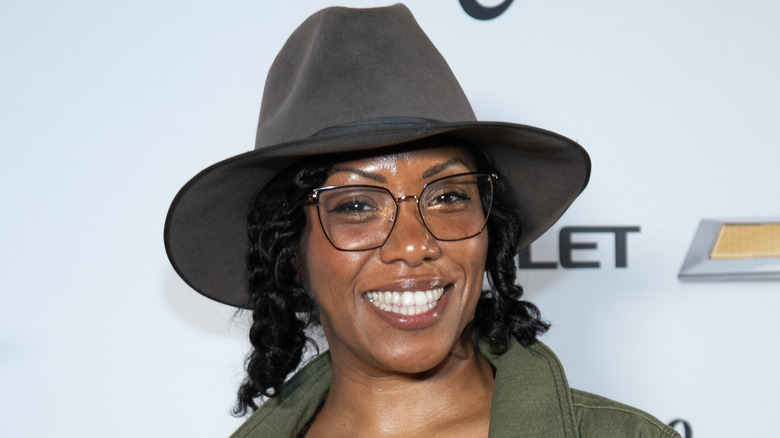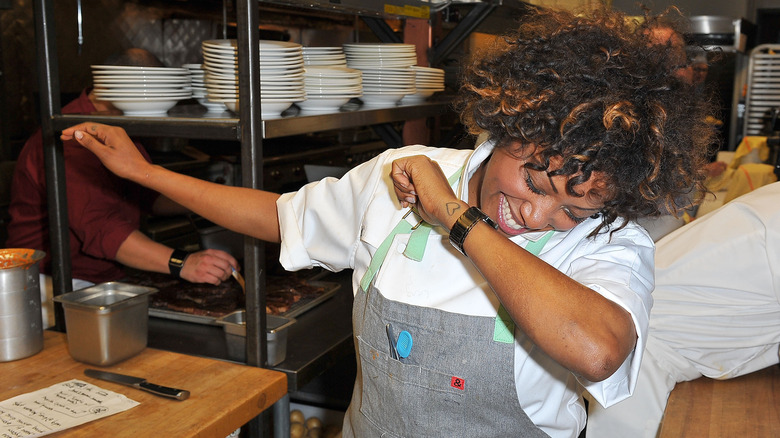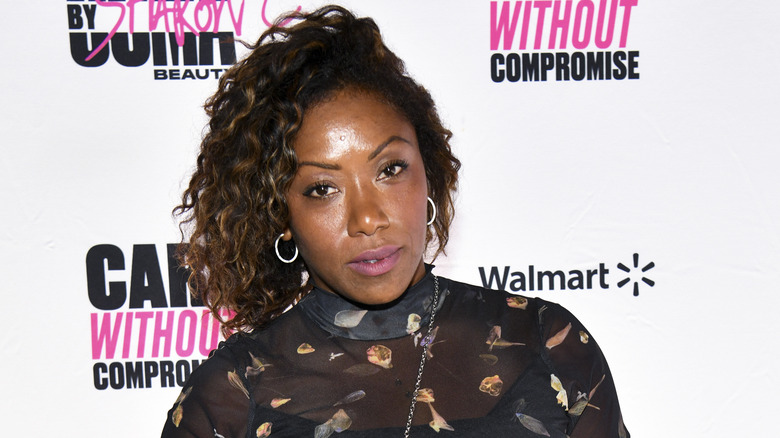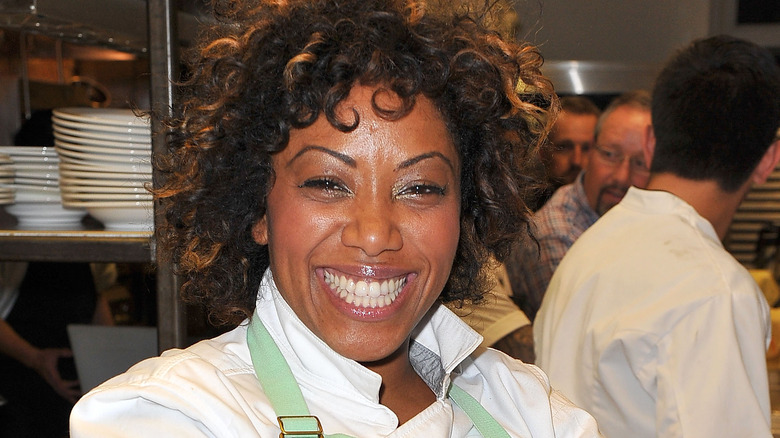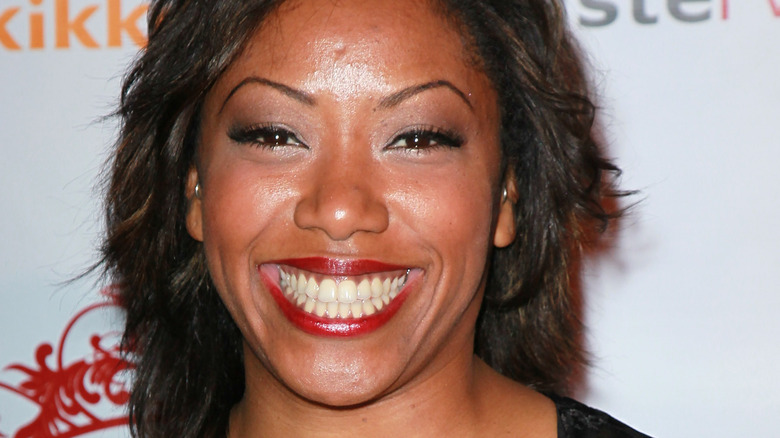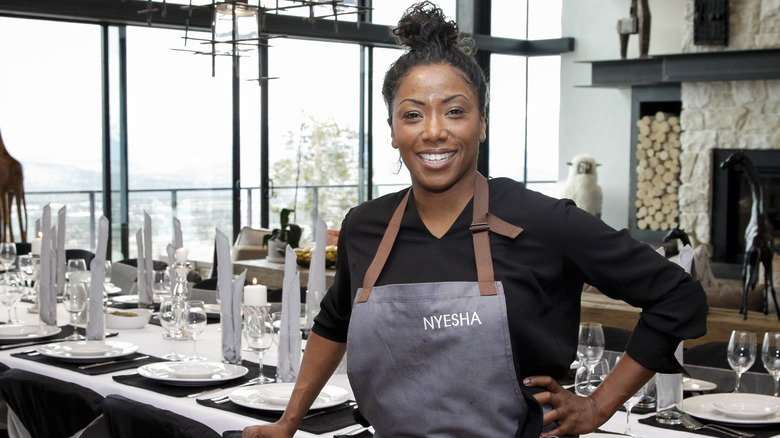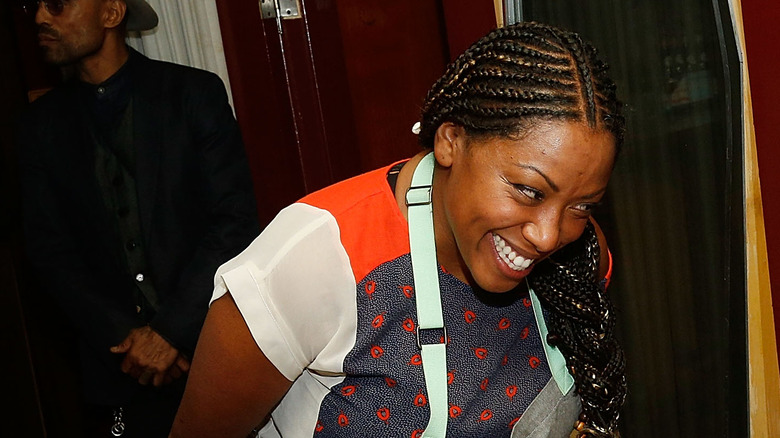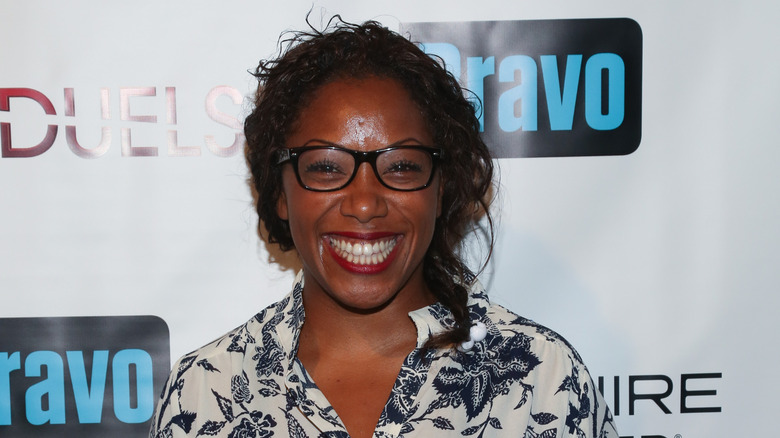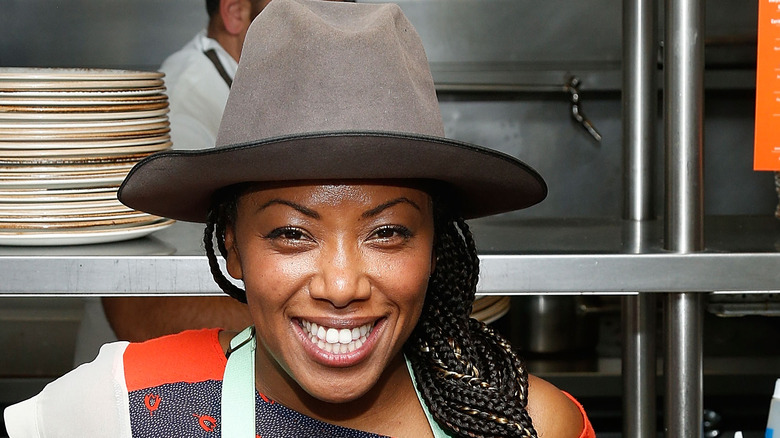Nyesha Arrington Talks Top Chef And How She Met Gordon Ramsay - Exclusive Interview
Nyesha Arrington connects to cooking in a way that few others in the universe do. It's not just her raw talent — talent which she refined in Michelin-starred restaurants, working with the likes of the legendary Joël Robuchon. It's not just her drive, either. Arrington's drive, of course, might be why you know her name. Maybe you've seen Arrington on "Top Chef," "Guy's Grocery Games," "Tournament of Champions," or "Selena + Chef." If you haven't, you'll likely watch her in the upcoming "Next Level Chef," a new series in which she collaborates with Gordon Ramsay and Gino D'Acampo. Or perhaps you've just started listening to Arrington and restaurateur, Philip Camino, on their new daily podcast, "Happy Mouth."
But beyond Arrington's talent and drive is her magic: the chef makes cooking into a taste-able love letter. If you weren't lucky enough to try some of Arrington's food at either of her since-closed restaurants — Native in Santa Monica and Leona in Venice (via Los Angeles Times) — all hope's not lost. Arrington discusses dream projects, TV shows, the new podcast she co-hosts, and shares unmissable cooking tips in this exclusive interview with Mashed.
Nyesha Arrington reveals her favorite memories of Top Chef
I see a lot of similarities in your and Padma Lakshmi's culinary work. For both of you, cooking is about so much more than food. It's about culture and social justice, and heritage. I know that you've worked with Padma on "Top Chef," and I'm wondering if you had any memories from that you could share?
Memories of Padma. Yeah. I mean, she's a dynamic human. I would say I don't have super close memories. My only memory really, I would say, that stands out when you ask that question — what image showed in my mind was– when we did "Top Chef Texas," and she walked out and for the first time. I was like — and I think it was the wind or something — I was like, "this human is so dynamic." She just owns the space, so fierce and [she has] beautiful energy.
I would say one of my awesome memories of "Top Chef" in general was, it was like Tom Colicchio, Padma, and also Emeril Lagasse sitting at the table to get into the competition. The Texas one, it started with 100 chefs and then went down to 30, then went down to 15. So, you were trying to get your chef coat. And I made a brazed pork ravioli, like a Southwestern Texas vibe. And I remember standing at that judges' table. I've never done television, and I was like a little birdie. I made my dish part on the table, but I really went all out, made the pasta dough, brazed pork, shredded it, made this beautiful stew, like pizza tomato and roasted corn salsa, and left it all out there to show technique. And then when they bit into that pasta, the faces that they made — I was like, "hell yes, this is amazing.'"
I wish you could bottle up that energy and sell it. Because it was such a gratifying moment... It was a culmination of a lot of things, just your whole life path, your career to that moment — the ingredients. And I grew up watching Emeril, and obviously, Padma and Tom were legends. It was so beautiful. It was a cool, cool moment. That was probably one of my favorite memories.
Nyesha Arrington talks about going on MasterChef with Gordon Ramsay
Are we going to see you on "Next Level Chef" with Gordon Ramsay and Gino D'Acampo?
Yeah. I'll tell you all about it. It was the best thing that happened to me last year... Basically, I went to go be a guest judge on [Ramsay's] show, "MasterChef," to show the finalists how to make this dish. Come to find out, the dish that I made was this Robuchon potato and [Ramsay] worked for the same chef, Chef Robuchon way back in the day.
I worked for the chef Joël Robuchon, and probably this had to be 2008 maybe, or 2009. [Gordon Ramsay] walked through the kitchen where I was working, and I was like, "Oh my God"... He was walking around the kitchen and looking at everyone's station and I was in awe... I just think that [Ramsay] has been a chef that really took cooking to the next level. Way back then, I said, "Well, I'd love to work with him one day."
Twenty years later or 15 years later, fast forward, I get to cook this dish in front of him. And I just feel like as a chef, really more so as a cook — it's not even like the big term "chef,'" just as a person who's passionate about cooking — I just felt like I connected with him on that set. I'd never really been on a set that was run by a chef — a true chef — and it was cool. It was run like a kitchen, and I enjoyed that process. After we finished taping, he came out and he shook my hand and he said, "What a pleasure to watch you cook," and "Nice to meet you" and "Who are you?" and all those things.
So I told [him] a bit about myself and, honestly, I had a tear in my eye because it was such a powerful moment. I know I sound so nerdy recalling the story, but it meant a lot to me because it was a long time coming. And I know he just has such an amazing talent and is able to execute food on such a technical level that I respect so much.
Nyesha Arrington on why she said yes to Next Level Chef with Gordon Ramsay
I'm wondering why you said yes to ["Next Level Chef" with Gordon Ramsay] and what the casting process was like?
This is my first network television show, and what initially drew me to it, to the casting process — aside from all that connecting [with Ramsay] as a chef — that was [the] great best-case scenario. And then aside from that, the producers reached out and were like, "Hey, what are you passionate about?"
And I said, "Mentorship, mentorship, young minds continuing to water the soil." And we went back and forth and over time through the pandemic and things and had conversations of what [a] show could look like. And they talked about the show "Next Level Chef," and it being mentorship-based ... You asked me why did I say yes, for me, that's a no-brainer. I came up under a very, how do I say, a fiery regime for most of my career ... I think that there's fear-based leadership and I think there's love leadership. And I think for me in my chef journey, the love leadership is really what inspires people. So, the idea that I get to help change people's lives.
I'm not ultimately competing, but I know d**** well how it feels. I am not that far removed from the cooking competition world that I cannot relate to how it feels to be on the other side. So for me, it's a cool coaching opportunity almost. Because I grew up playing sports and my dad was a coach of my softball team. I think that on the journey that I've been [on] ... living in the Virgin Islands taught me a lot about leadership skills. What happens when you're working with a whole different culture, just lots of little things, many successes, many failures. [You learn] what works and what doesn't work in leadership. It's a journey in itself. And I've made tons of mistakes growing up.
I think that now being able to share my life data with people and hopefully inspire some kids out there, and ultimately honestly, like inspire women of color. Because I grew up without seeing any women of color in any kitchen, ever. And it's not like, I'm like, "Hey, here's my flag, here's my card." But more so, the fact that I believe representation matters. And to be on a network television show, up there doing the d**** thing after like 20 years dedicated to the game, dedicated to living that life, it's just been like a different upbringing ... As humans, we have a responsibility to share our life teachings with people. I think ultimately that's what we do in storytelling. That's all we're doing is telling stories of the past, and creating a path forward. So I think that's really exciting to me.
What being on TV has taught Nyesha Arrington
One of your regrets about "Top Chef" is not showing more of your story and sharing more of your narrative and personality. How has that experience changed the way you approached telling your story to the world as a chef?
I'll be honest, this is a very vulnerable statement for me. I think that when you are coming up in the culinary world as a young person, you don't know – I'm speaking for myself – but you don't know which way to go. Like for me, I'm like, "I'm just going to start at the top," which was Michelin. What's the hardest I can do? I'm going to do that. That's my weird competitive spirit. So I did that for so long and [I'd] be at very uncomfortable places at times, very hard kitchens to work in. But as a craft person, craftswoman, craftsman, I am always passionate about trying to learn everything about my craft. And so I think that that's really what drives me ultimately. So, going on "Top Chef" I was so, so freaking nervous and so I didn't know how to be not nervous. I'd only been in restaurant kitchens. And in restaurant kitchens, it's a completely different personality.
I don't think really I was ready for that, emotionally. But it was fun. It was an amazing experience ... As I've gotten more comfortable in front of the camera, I think, two things: doing television, and also being able to display your craft is so freaking cool. It's the most amazing tool of communication. Because ... it's really exciting and dynamic to be able to communicate with many [people] on a wide, vast lens in multiple countries. I just think it's so amazing.
And so, over time, small stage or big stage, I really relish those moments of [being] able to lean into authenticity and share with people. Because when you can make everyone around you feel comfortable, you just create magic, and we're just documenting memories.
When I started shooting the YouTube show called "Improv Kitchen," I shot it in my apartment and I had no idea what I was doing. We did like six episodes or so, but it was my freaking savior because I'm the type of person who needs to be creating at all times. That's just how my brain works. That is the energy that feeds me. ... And so when this came around, it was exciting to me because I got to learn a new appreciation for what happens behind the lens, so to speak, and how it all comes together.
Nyesha Arrington shares what it was like to teach Selena Gomez
I want to know about your experience with "Selena + Chef." You made a dish that Selena [Gomez] fell in love with. How did you decide what to share with her and what to share with the world on that show?
First of all, it's really amazing to be able to cook virtually with her, because, we weren't able to do a lot, outside of that. So to be able to connect with someone during the pandemic was amazing. And she has such ... a student spirit. She's really like, "Okay, I want to learn this technique and recreate it." ... And that's what I'm talking about, the whole mentorship and coaching thing, because towards the end of the episode, her and her friends were killing it.
They're doing all the things, they're plating their dish and one of them goes like, "Oh my gosh, guys, should we open a catering company?" And it's just so cute because they had the confidence to.
I chose a technique that I thought that she could use at some point, which is basically [how to] break down fish, and sauce making. Because anyone should technically be able to make a good pan sauce. It's more of the technique, and then you can mix and match from there. I wanted to teach her things that I think she could use in everyday life.
Nyesha Arrington discusses how Anthony Bourdain touched her life
You had the opportunity to have a conversation with Anthony Bourdain after reading "Kitchen Confidential." Could you give us some insight into what his legacy means to you personally?
Yeah, absolutely. Well, it was a hard few years for me... because Anthony Bourdain passed away. And we're gonna talk about Anthony Bourdain, but also, Jonathan Gold passed away and also, Joël Robuchon. Those three people had a really huge impact on my life. So when Anthony passed, it was really gut-wrenching to me. I remember we had an event that day and it was really hard for me to even function. It's so interesting how you can feel so connected to someone without really knowing them. I mean, I've had a conversation or two with him here and there over the years. But, I think he was so much more than just a food person. Just him as a personality, how he processed information, how he articulated information.
I think it was also his unintentional way of saying, "I'm kind of anti-this-system." He was so rock and roll. And there was a very, for lack of a better term, sexy side of the food industry, that was just at that time, was very rock and roll. I don't know how else to say it. And so, he wrote about all of this. Who he has become in the food world in terms of a lens to a global perspective, kind of like this global citizen vibe about himself [that] was just beautiful. And I personally can really — how do I say it — just assimilate to that. Because I think it's interesting from my food perspective, I cook food that I'm inspired by. I don't say that my food is any one style. Because... I think it's the cooking shows that make people say, "Oh, I'm this ethnicity, so I can only cook this food." I think appropriation is a completely different conversation, but I think it's not just like cooking by race.
I think Anthony, he really had a beautiful perspective on where we were going [from] a food media lens also ... I'm not saying he was anti "Top Chef," but he was kind of anti-establishment in terms of food media. And I think it's a beast. It was just interesting to always see his perspective on that world as well, which I respect... You can have different schools of thought, everyone doesn't need to be in the same kind of bubble.
Nyesha Arrington on mac and cheese and generational food memories
You've given us the gift of your grandma's lemon meringue pie recipe, but you also said that your Aunt Linda made the best mac and cheese. Can you let us in on the secret about that?
Oh, I love that. She was the best. My Aunt Linda was the matriarch. She's no longer with us, but she was the matriarch of the family. She would hold all the Thanksgivings. She remembered everyone's birthday. She just was the best aunt ever. And her and my three cousins who are boys — it just instilled so much amazing, positive, beautiful food data of like good memories through food. So yeah, Aunt Linda, she was kind of like the big mac and cheese person. My cousin Asia actually makes her mac and cheese very similar to hers ... It's all in the roux. I think that's her biggest thing, is that you have to nail the roux and really cook the roux very low and slow and just making sure that the flour is lightly toasted.
I think that's the most important thing as she would say. Because that's how I do it. But we just had a mac and cheese contest probably three weeks ago, actually, at a family barbecue. And two of my cousins made theirs and I made mine. And the thing is me and my cousin, we make it the same, where we make a very big Mornay kind of sauce and fold the cooked pasta in, and then just melt the cheese on top. So it's really creamy, which is one style. But yeah, it's like that classic kind of Thanksgiving mac and cheese is her vibe. So delicious. Oh, and nutmeg. She always put a little nutmeg in it.
Nyesha Arrington shares more pro cooking tips
You are now sharing your gift with your nephew, who you've called your resident "egg cracker." Is there any dish you hope he remembers when he grows up?
Honestly, this is going to sound basic, but I would say scrambled eggs. Because that's what he and I would make together, because it's like the easiest thing. But there's a true art to making beautiful scrambled eggs, and that's something that we'd always do together. I would say that I hope he remembers that. Yeah. Good kid. His favorite food is shrimp. It's so funny ... I don't know where he gets that from, but for his birthday, I always make him a shrimp dish.
There is a true art to making beautiful scrambled eggs. What's your secret?
I'm really like detailed about it, though. It's really important to, if you're going to go all out [to] scramble the eggs and then strain them. Because the albumin has a higher water content to it. So, it doesn't dissolve. You really want to strain out any bits like that so you get a really smooth, beautiful texture. And then, using great salt, like very good, nice light flaky salt, is really important. Then, I put in just a tiny splash of cream and whisk it. That's really beautiful. And then, I use great butter and a beautiful non-stick pan.
And I heat my pan and add the egg, but then turn the heat down very, very, very low. And [I] put in a little knob of extra butter and just move [the eggs] around and let them set. Move them around, but not too much because I like a little bit of a ribbon, you don't want it to be too scrambled. And then just really let the residual heat cook through. But I love chives with my scrambled eggs, like a little bit of creme fresh and chive and flaky salt, which is like really French style. But I just think that they're so beautiful.
Having lived for a year on a plant-based diet, could you offer a plant-based recommendation for meat lovers?
Oh yeah, absolutely. It's really delicious ... So what I found was, I grew up eating ground beef ... [and] you could use this as a great taco substitute for like, if you're looking for a ground beef substitution. I use equal parts of chopped walnuts, finely chopped walnuts with very, very finely chopped or pulsed down white button mushrooms.
If you cook those together with like taco seasoning — basically cumin, paprika, garlic powder, onion powder, salt, pepper, maybe some chili, some onions — the texture is pretty similar to a ground taco meat and just easier to digest, if you're looking for a substitution, pretty good.
What kind of project we might see from Nyesha Arrington in the future
What does a dream restaurant look like for you and what kind of menu items might we look forward to?
I think it's important to always be progressive, right? I mean, that's something that has been constant in my life. I've definitely had, how do I say, opportunities for growth, in my previous two restaurants not working, necessarily. And what I've learned about my personal culinary journey is that a chef is really an artist of the time. I think that's really a part of our fabric of who we are as creatives. [It's] you expressing what is happening in more than just a food world. We see it with the plant-based movement, we see it with the talks of global warming. And I think my point is that food has an enormous dialogue.
So, I think for me, when I just look at my past, I've really honed my skills and craft to be rooted in that opulent dining, white tablecloth, the caviar ... all of that. Which I adore, I love it. There's pieces of me that love experiential dining. I mean, that's part of my DNA. But I think as I'm a chef, I'm constantly on this pursuit of ... just like a deeper self-awareness. I think that's really kind of the lens that I'm coming from when I cook, because it's a very vulnerable thing to be nurturing to serve, or serve someone is an act of ... It's a love language ultimately.
To share that, I think it's like the old model was kind of like, it was like the restaurant. For me, it's a little bit more diverse. And, I really want to feed multiple people, but I think the expression of an artist is ever-changing. I think when I look at my inspiration, it's definitely what's in season and who I am as a creative from a nationality standpoint ... Given my background, African-American-Korean, I have had some diverse flavors, but I think celebrating those two as its own, unique cuisine could be a beautiful thing.
Nyesha Arrington discusses mental health in the food industry
It's evident on your Instagram that you take really good care of your health, both physically and mentally. What does mental health in the food industry mean to you?
Wow. I love that question ... Where are we? 2021. I've been doing ice baths since 2019. And that was the biggest growth year for me. Because, all honesty, it was just a very difficult climb. I shouldn't say "was" as past tense, it always is. I think to anyone [with] a growth mindset, you can get this kind of like — you're always in growth mode — there's not really any space for comfortability. Because all of the growth happens in uncomfortable spaces. When you're in pursuit of that North Star, you have one scope, so you just keep going.
And for me, 2019 was the first year I just took a little beat for myself. I closed my restaurant ... and it was necessary for me to take some respite. Because ... I would say 2017 ... it all sort of culminated. I think I was the most unhappy that I'd been in my entire career ... I really looked at my life and said, "How can I heal?" I think it's just been so much trauma over the years of being in the industry. And, of course, there's some triumphs as well. But emotionally, it's a very tough industry for me, speaking for myself, and the experiences that I have.
So 2019 I said, "How do I make some positive changes?' For me, that was going completely raw-vegan because I wanted to reset my entire microbiome, my entire system. Because I think with anything that you want to do well, you really have to start at the root. For me ... I look at food as medicine. So, I was raw vegan for about nine months and it was great. I felt very optimized as a human ... It was like, no nothing, no caffeine, no refined sugar, no alcohol ... It offered me this amazing amount of clarity. And then I went to Hong Kong and that's where I broke my vegan fast.
At that time, I was working out a lot and I fell in love with fitness. Because ... I think for me, fitness was the first place that I saw women that could be strong ... This was the first time that I disassociated strength with masculinity because I've only ever worked with men — European men — my entire career. And I'd never worked for a female chef, I never worked for a chef of color. When I went to the gym ... I was getting really strong and lean and just really dialed. The people around me were the same way. I felt this renewed sense of strength in myself because I'd never been around that energy from a female perspective. It was this cool experience, as basic as that sounds. But ... that wasn't my upbringing. So that was a huge, inspiring epiphany for me.
Nyesha Arrington on why she takes ice baths
You take ice baths and have for a while. How does that help you?
We started doing the ice bathing and when I had no animal protein in my body and when I was completely highest alkalinity, most likely that I'd had in my life because I was eating only foods that had basically electricity, so like high pH, that I felt the most clear.
I remember the second ice bath that I did. I have this image of myself, like literally, my mind thought this. I was sitting in this grassy place, like [a] hilltop, [in a] vast mountain range, very lush and green. And I was sitting on top of a mountain and my perspective was like, I was a drone circling around myself. And there was a complete deafening silence around me. I can only say that was the highest state of consciousness that I've ever [reached] and so I think the ice really provided that for me.
I am a huge believer [in] ice baths and mental health. Because when you are able to put a — I'll use the word stress but it's not really stress — I would say an uncomfortability on your body like that, and the amount of presence it takes you to breathe through that ... It just puts your mind at a higher threshold for when things don't go right. And I think it's really important. I've also done deprivation tanks, which is really cool. It's like really dark, no sound, and you basically sit in a tank for about two hours and you hear nothing and you can see nothing and you basically float in a salmon solution in a float tank, and it's awesome.
I think it's just nice to find peace. Because there's so much chatter in the world. We're always inundated with data, like 24/7. And it's nice to check out, because I think we're still living right now in tandem with the cause and effect of the digital age, and it's progressing so quickly. So, I think yeah, just presence is really important.
Nyesha Arrington discusses changes the food industry needs and her new podcast
You and Philip Camino have an upcoming podcast, "Happy Mouth," which deals with where the food industry is going and how it's recovering and reforming after the pandemic. Numerous restaurants have reported a labor shortage. Has the same kind of thing is happening to you?
I do monthly experiential dinner events around LA and around the globe. So for me, my model's a little bit different than a standard restaurant. I source people before the event, or before I hit the ground in any given place that I go. So I think in my experience, it hasn't been too difficult to find people. I think what the conversation is around really retaining the people and creating a safe and nurturing diverse environment. I think that's what today's cook really wants. Because, from my experience back in the day ... it wasn't a priority like mental health, physical health, [or] really valuing the employee.
Ultimately, the industry is really trying hard to heal ... So I think in carrying that dialogue out, I think that people really just want an environment where it's solid. Yeah. So I think that, you've seen a lot of different incentive programs ... retention programs and things like that. But I think ultimately, yeah, it's important to keep nurturing the soil and trying to build that environment where people feel seen and heard.
On your podcast, one of the things you talk about is sustainability in the food industry, and you say that one thing that you cover is bugs are a sustainable protein source. Can you discuss that a little?
Yeah. I mean, am I a bug enthusiast? No. I have eaten bugs. I've eaten cricket and that's about it. And I mean, I think from a sustainability standpoint, that's a conversation that we all definitely need to be having. For me, I think just having a mini garden and keeping my carbon footprint low — for the most part, I stay pretty local. I carpool ... and I ride my bike a lot. I try not to buy plastic that is non-biodegradable, just all the normal things that we should all be doing as humans.
Want to hear more from Nyesha Arrington? Make sure to tune into her new podcast with Philip Camino, "Happy Mouth."
